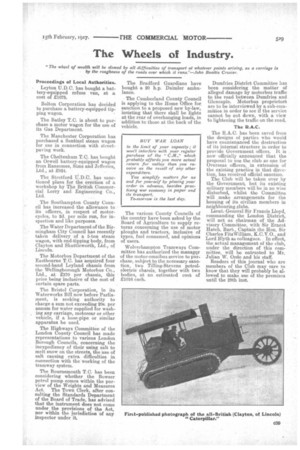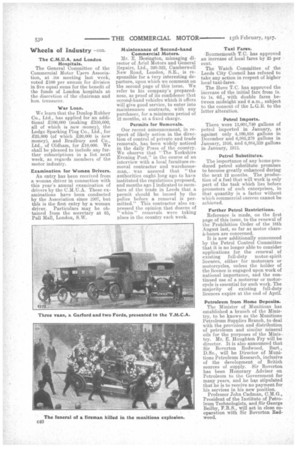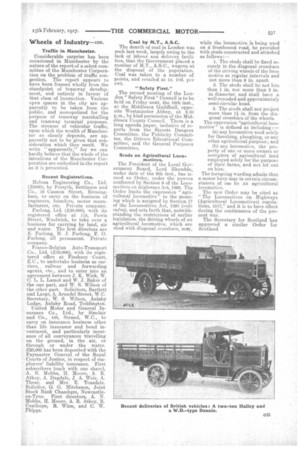The Wheels of Industry.
Page 9

Page 10

Page 11

If you've noticed an error in this article please click here to report it so we can fix it.
The wheel of wealth will be slowed by all difficulties of transport at whatever points arising, as a carriage is
by the roughness of the roads over which it runs."—John Beattie Crozier.
Proceedings of Local Authorities.
Leyton U.D.C. has bought a battery-equipped refuse van, at a cost of 21075.
Bolton Corporation has decided to purchase a battery-equipped tipping wagon.
The Batley T.C. is about to purchase a motor wagon for the use of its Gas Department.
The Manchester Corporation has purchased a Sentinel steam wagon for use in connection with streetpaving work.
The Cheltenham T.C. has bought an Orwell battery-equipped wagon from Ransomes, Sims and jefferies, Ltd., at £924.
The Stretford U.D.O. has sanctioned plans for the erection of a workshop by The British Commercial Lorry and Engineering Co., Ltd.
The Southampton County Council has increased the allowance to its officers, in respect of motorcycles, to 2d. per mile run, for inspection and like purposes.
The Water Department of the Birmingham City Council has recently taken delivery of a 5-ton steam wagon, with end-tipping body, from Clayton and Shuttleworth, Ltd., of Lincoln.
The Motorbus Department of the Eastbourne T.C. has acquired four second-hand Leyland chassis from the 'Wellingborough Motorbus Co., Ltd., at 2370 per chassis, this price being inclusive of the cost of certain spare parts.
The Bristol Corporation, in its Waterworks Bill now before Parliament, is seeking authority to charge a sum not exceeding 20s. per annum for water supplied for washing any carriage, motorcar or other vehicle, if a hose-pipe or similar apparatus be used.
The Highways Committee of the London County Council has made representations to various London Borough Councils, concerning the inexpediency of their using salt to melt snow on the streets, the use of salt causing extra difficulties in connection with the working of the tramway system.
The Bournemouth T. C. has been considering whether the Bowser petrol pump comes within the purview of the Weights and Measures Act. The Town Clerk, after consulting the Standards Department of the Board of Trade, has advised that the instrument does not come under the provisions of the Act, nor within the jurisdiction of any inspector under it.
The Bradford Guardians have bought a 20 h.p. Daimler ambulance.
• The Cumberland County Council is applying to the Home Office for, sanction to a proposed new by-law, insisting that there shall be lights at the rear of overhanging loads, in addition to those at the back of the vehicle.
The various County councils of the country have been asked by the Board of Agriculture to supply returns concerning the use of motor ploughs and tractors, inclusive of types, fuel consumed, and opinions of users.
Wolverhampton Tramways Committee has authorized the manager of the motor-omnibus service to purchase, subject to the necessary sanction, two Tilling-Stevens petrolelectric chassis, together with two bodies, at an estimated cost of 21016 each.
Dumfries District Committee has been considering the matter of alleged damage by rnotorbus traffic to the road between Dumfries and Glencaple. Motorbus proprietoit are to be interviewed by a sub-committee in order to see if the service cannot be cut down, with a view to lightening the traffic on the road.
The R.A.C.
The R.A.C. has been saved from the designs of parties who would have countenanced the destruction of its internal structure in order to provide Government offices. It is now officially announced that the proposal to use the club as one for Overseas officers, in extension of the existing practice in that direction, has received official sanction.
The Club will be taken over by the Government, but its existing military members will be in no wise disturbed, whilst tho Committee will make arrangements for the housing of its civilian members in neighbouring Dlubs.
Lieut.-General Sir Francis Lloyd, commanding the London District, will net as ohairman of the Advisory Committee, with Sir Ernest Hatch, Bart., Captain the Hon. Sir Charles FitzWilliam, K.C.V.O., and Lord Blyth as colleagues. In effect, the actual management of the club, under the direction of this committee, will ho entrusted to Mr. Julian W. Orde and his staff.
Readers of this journal who are members of the Club may care to know that they will probably be allowed to make use of the premises until the 28th inst. The C.M.U.A. and London Hospitals.
The General Committee of the Commercial Motor Uors Association at its meeting last week, voted £100 per annum for division in five equal sums for the benefit of the funds of London hospitals at the discretion of the chairman and hon. treasurer.
War Loan.
We learn that the Dunlop Rubber Co., Ltd.' has applied for an additional 1100,000 (making £350,000, all of which is new money), the Lodge Sparking Plug Co., Ltd., for £25,000 (of which £20,000 is new money), and Bradbury and Co., Ltd., of Oldham, for £10,000. We shall be pleased to include any further subscriptions in a list next week, as regards members of the motor industry.
Examination for Women Drivers.
An entry has been received from a woman driver in connection with this year's annual examination of drivers by the C..M.U.A. These examinations have been conducted by the Association since 1907, but this is the first entry by a woman driver. Particulars may be obtained from the secretary at 83, Pall Mall, London, S.W. Msintenance of Second-hand Commercial Motors.
Mr. E. Heringtoa, managing director of Ariel Motors and General Repairs, Ltd., 320-322, Camberwell New Road, London? S.E., is responsible for a Very interesting departure, upon which we comment on the second page of this issue. We refer to his company's preparedness, as proof of its confidence that second-hand vehicles which it offers will give good service, to enter into maintenance contracts, with any purchaser, for a minimum period of 12 months, at a fixed charge.
Permits for Removals.
Our recent announcement, in respect of likely action in the direction of control of private and trade removals, has been widely noticed in the daily Press of the country. We observe that " The Yorkshire Evening Post," in the course of an interview with a local furniture-removal contractor and warehouse was assured that "the authorities ought long ago to have instituted the regulations proposed, and months ago I indicated to members of the trade in Leeds that a permit should be issued by the police before a removal is permitted." This contractor also expressed the opinion that dozens of " whim " removals were taking place in the country each week. Taxi Fares.
Bournemouth T.C. has approved an increase of local fares by 25 per cent.
The Watch Comadttee of the Leeds City Council has refused to take any action in respect of higher local taxi-fares.
The Hove T.C. has approved the increase of the initial fare from is. to is. 6d., with double fares between midnight-and 6 a.m., subject to the consent of the L.G.B. to the latter alteration.
Petrol Imports.
There were 13,001,740 gallons of petrol imported in January, as against only 4,100,858 gallons in December and 6,985,279 gallons in January, 1916, and 6,984,339 gallons in January, 1915.
Petrol Substitutes.
The importance of any home-produced petrol substitute promises to become greatly enhanced during the next 12 months. The production of a fuel that will work ia only part of the task which lies before promoters of such enterprises, in that quantity is a factor without which commercial success cannot be achieved.
Further Petrol Restrictions.
Reference is made, on the first page of this issue, to the renewal of the Prohibition Order of the 18th August last, so far as motor charsa-bancs are concerned.
It is now additionally announced by the Petrol Control Committee that it is no longer able to consider applications for the renewal of existing full-duty motor-spirit licences, either for motorcars or motorcycles, unless the holder of the licence is engaged upon work of national importance, and the continued use of a motorcar or motorcycle is essential for such work. The majority of existing full-duty licences expire at the end of April.
Petroleum from Home Deposits.
The Minister of Munitions has established a branch of the Ministry, to be known as the Munitions Petroleum Supplies Branch, to deal with the provision and distribution of petroleum and similar mineral oils for the purposes of the Ministry. Mr. E. Houghton Fry will be director. It is also announced that Sir Boverton Redwood, Bart., D.Sc., will be Director of Munitions Petroleum Research, inclusive of the development of British sources of supply. Sir Boverton has been Honorary Adviser on Petroleum to the Government for many years, and he has stipulated that he is to receive no payment for his services in his new position.
Professor John Cadman, C.M.G., President of the Institute of Petroleum Technologists, and Sir George Beilby, F.R.S., will act in close cooperation with Sir Boverton Redwood. Traffic in Manchester.
Considerable sarprise has been occasioned in Manchester by the nature of the report of a select committee of the Manchester Corporation on the problem of traffic congestion. The report appears to have been framed wholly from the standpoint of tramway development, and entirely in favour of that class of locomotion. Various open spaces in the city are apparently to be taken from the public, and monopolized for the purpose of tramway marshalling and tramway terminal purposes. The streams of vehicular traffic, upon which the wealth of Manchester so closely depends, are apparently not to be given that consideration which they merit. We write "apparently," for we can hardly believe that the whole of the intentions of the Manchester Corporation are embodied in-the report as it is presented.
Recent Registrations.
Helena Engineering Co., Ltd. (25000), by Forsyth, Bettinson and Co., 36 Cannon Street, Birmingham, to carry on the business of engineers, founders, motor manufacturers, etc. Private company. Furlong, Ltd. (230,000), -with its registered office at 115, Powis Street, Woolwich, to take over a business for carrying by land, air and water. The first directors are E. Furlong, H. J. Furlong, F. 0. Furlong, all permanent. Private company. Franco-Belgian Auto-Transport Co., Ltd. (210,000), with its registered office at Finsbury -Court, BC., to undertake business as carriers,. railway and forwarding agents, etc., and to enter into an agreement between-J. K. Wick, W. C. 14 L. La-met and W. J. Baker of the one part, and W. S. Wilson of the other part. Solicitors, Bartlett and Large, 3, Arundel Street, W.C. A Secretary, W. S. Wilson, nlaby Lodge, Anlaby Road, Teddington.
United Motor and General Insurance Co., Ltd., by Sinclair and Co., 448, Strand, W.C., to carry on insurance business other than life insurance and bond investment, and particularly insurance of all conveyances travelling on the ground, in the air, or through or under the water. £20,000 has been deposited with the Paymaster General of the Royal Courts of Justice, in respect of employers' liability insurance. First subscribers (each with one share), A. N. Mobbs, H. Moore, A. R. .Atkey, A. Dugdale, J. A. Weir, A. Thear, and Mrst. E. Teasdale. Solicitor, G. G. Mitcheson, Joint Stock Bank Chambers, Newcastleon-Tyne. First directors, A. N. Mobbs, H. Moore, A. R. Atkey, B. Coathupe, B. Win; and C. W. Phipps, Coal by ALT., A.S.C.
The dearth of coal in London was such last week, largely owing to the lack of labour and delivery facilities, that the Government placed a number of 141.T., A.S.C., wagons at the disposal of the population, Coal was taken to a number of points, and retailed at Is. 10d, per cwt.
"Safety First."
The second meeting of the London" Safety First" Council is to be held on Friday next, the 16th inst., at the Middlesex Guildhall, opposite Westminster Abbey, at 2.30 p.m., by kind permission of the Middlesex County Council. There is a long agenda paper, inclusive of reports from the Streets Dangers Committee. the Publicity Commit. tee, the Drivers Educational Committee; and the General Purposes Committee.
Studs on Agricultural Locomotives.
The President of the Local Government Board, Lord Rhondda, under date of the 6th inst., has issued an Order, under the powers conferred by Section 9 of the Locomotives on Highways Act, 1896. The Order limits the expression "agricultural locomotive" to the meaning which is assigned by Section 17 of the Locomotives Act, 1898 (vide infra), and sets forth that, notwithstanding the restrictions of earlier legislation, the driving wheels of an agricultural .locomotive, which are shod with diagonal crossbars, "wry,
while the locomotive is being used on aT frostbound road, be provided with studs constructed and attached as follows: 1. The studs shall be fixed securely in the diagonal crossbars of the driving wheels of the locomotive at regular intervals and not more than 9 in. apart.
2. The studs shall be not less than 1 in. nor more than 2 in. in diameter, and shall have a well-rounded and approximately semi-circular head.
3. The studs shall not project more than 1 in. from the diagonal crossbars of the wheels. The expression "agricultural locomotive" is defined as including
(a) any locomotive used solely for threshing, ploughing, or any other agricultural purpose; and (b) a,ny locomotive, the property of one or more owners or occupiers of agricultural land employed solely for the purpose of their farms, and not let out on hire.
The foregoing wording admits that a motor lorry may in certain circumstances of use be an agricultural locomotive.
The new Order may be cited as "The Locomotives on Highways (Agricultural Locomotives) regulations, 1917," and it is to have effect during the continuance of the present war.
The Secretary for Scotland has approved a similar Order for Scotland.






















